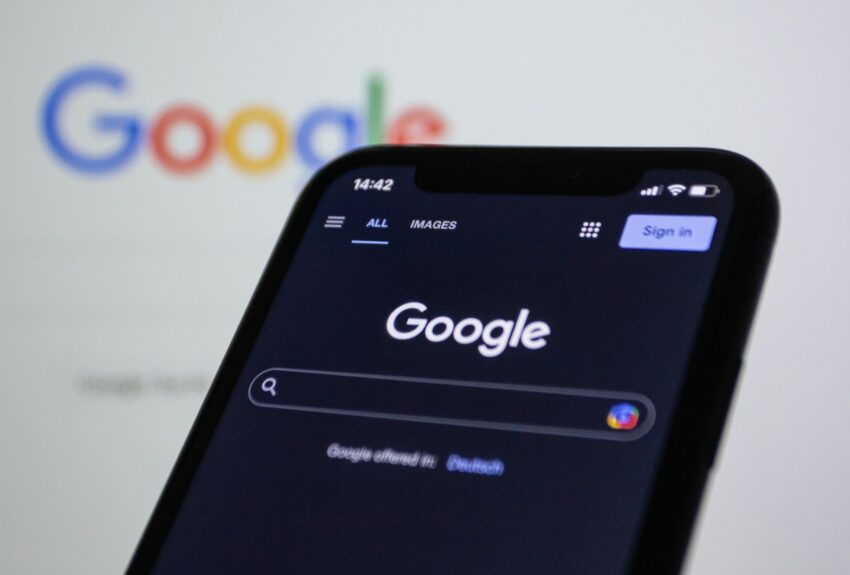Google’s stated goal has always been to provide information to a user before they know they need it.
Depending on your mileage, that is either a very benevolent service, or an extremely invasive overreach of common decency / privacy.
In any case, we’re pretty far into it now. And the big secret is: serving you information is easy. Turning that into a business is complicated. Google’s services have always been free for users, and they’ve always been funded by the world’s biggest advertising network.
Their success is all achieved through data: they own gmail, google maps, google home, google pay, android, etc. – so they can say with 100% accuracy where you are / who you’re with / what you like to do / when you like to do it etc.
That could be as simple as ‘Google knows you are in Sheffield, so it will provide you local restaurants in Sheffield when you search ‘restaurants near me’.
Or as sinister as: Google knows you received an email saying your car loan repayment is overdue, so it will serve you ads for payday loans.
But however you cut this up, Google’s most significant money maker has always been search.
Google Search, at its core, is an index of websites.
The job of SEO has been to try to improve a websites’ rankings in that index.
Over the years, Google has constantly refined how it calculates two things: relevance and reputation.
If a site is deemed more relevant to a search term (and the user), it will rank higher.
If a site is deemed to have a better reputation than other sites, it will rank higher.
There’s an added tweak where certain features have been added to search to fulfil that goal of ‘getting the user the information before they know they need it’ – featured snippets, reviews, etc. But really those could be considered sub-sections of relevance and reputation anyway.
LLMs are different
They do not have an index in the same way Google does. They process information in an entirely different way, which is more about giving ‘the most probable correct answer’.
You’ve probably heard about ‘knowledge bases’ and ‘training data’ for LLMs. That basically means the resources that have been used by the LLM developer to create the LLM and ensure it has up-to-date knowledge.
The method of acquiring this knowledge is very similar to Google’s: they crawl the internet looking for information and encode that information. The Chatbots we use (like ChatGPT) can then answer questions about that information – and as we’ve said, they want to give the most probable correct answer.
But there’s a limitation. LLMs have nowhere near as much stored information as Google, or at least the information is stored in a way that makes it harder for a user to navigate. And that question of ‘most probable’ is really important.
There are lots of different LLMs, and they likely have different settings for how confident they need to be in an answer (to avoid hallucinations); when they should ask clarifying questions; and how much they should trust different sources.
If I ask an LLM to explain Pythagoras’ Theorem, it will be able to answer confidently and talk me through trigonometry to quite an advanced level. That’s because there is so much information about Pythagoras’ Theorem online. The model would have encoded the information over and over again, and will have a high level of confidence about the facts.
Pythagoras lived around 570 BCE, so his ideas have been part of the written record for the better part of 3 millenia. That’s quite a lot of training data.
But trouble emerges for the LLM when you ask about things that are less-widely written about.
Let’s take our earlier example: ‘What’s the best restaurant near me?’.
Google knew enough about me already to give me some recommendations.
But ChatGPT will almost certainly ask where I am. It might even ask for my budget and if I have any cuisine preferences.
And then it will provide me with the ‘most probable correct answer’ based on what it knows.
BUT it doesn’t know that much about the best restaurants in every city of the world – and that’s where it begins searching the web to find an answer.
I don’t know exactly how it works, but it seems very very very very similar to something like:
- Search Google
- Click all the links on the first page
- Analyse the pages
- Write a summary
(I don’t think ChatGPT actually just ‘searches Google’ (more likely Bing* due to their partnership); but when you look at the ‘Sources’ ChatGPT uses it’s hard to disprove my theory).
*And EVEN IF IT IS USING BING, the similarity in search between Bing and Google is very high. They use more or less the same ranking factors, and SEOs have always basically believed that focusing on Google (with its 95%+ market share) means Bing will be taken care of automatically.
—
So there’s our key differences:
1 – Google is trying to give users information before they know they need it. Despite that intention, organic search has always been working out how to rank a list of websites based on relevance and reputation.
2 – LLMs are trying to give users the most probable correct answer. This can seem like magic when you’re looking into a new topic (or using deep research to gather information
at scale) – but a cursory glance at its research / sources suggests something very close to Googling the answer.
Therefore there’s a temptation to say ‘ah, well if LLMs are just using Google results, I’m probably covered already’.
But that’s missing quite a few important details:
Ranking well in Google (i.e. having a website with lots of visibility) is a massive benefit for appearing frequently in LLM outputs.
But if you look at the kinds of sources being used by LLMs, they tend to prefer third-party sites; aggregators; marketplaces; directories; round-ups as their sources (i.e. not your website). And they make recommendations based on third-party suggestions in the sources.
So ranking your own website isn’t enough. You need to do that (Google is still the biggest search platform for now) – but you also need to improve your visibility off-site too. (In some quite specific places).
Optimising Your Website
Among hundreds of other factors, traditional SEO rankings are based on keywords, topical clusters & inclusion of NLP terms. Since 1997, Google has set the rules (ranking criteria) and success comes from being the best website among similar websites.
By contrast, LLMs are trained on huge amounts of publicly available data, and can make more specific judgements about what will be important to the user.
SEO = trying to be the most relevant / most useful based on specific ranking factors.
GEO = trying to be the ‘best’ based on factors valued by real people.
There is a huge amount of crossover (reviews, testimonials, links are all still important).
But the key to appearing in LLMs is to uncover what LLMs think users value, and ensure we’re signalling our strengths in those areas.
A simple experiment:
1. Go to Google 2. Search site:reddit.com “[your service]”
3. The results will tell you everything the public currently cares about when they talk about your service.
4. These are the things you should talk about on your site, in your FAQs, in your blog posts, on social etc – because they are the things that people care about (and therefore LLMs care about)*
*Also, Google has a $60m deal with Reddit to use its data to train Google’s AI models… so people’s opinions on Reddit are literally one of the biggest things Google’s AI values.
Optimising Off-Site Signals (reputation)
In traditional SEO, reputation was based (necessarily) on measurable network factors.
In short: if a node (web page) has lots of links from other nodes, it must be an important node.
Over time, those nodes took on ‘quality’ and ‘relevance’ factors, but the idea remained largely unchanged.
GEO still uses links to measure reputation, but links are less important. Citations and mentions carry greater weight. (Put differently, a link from the New York Times is great. But getting the New York Times to refer to you as ‘The most affordable coffee machine’ will increase your chances of LLMs producing your company when users ask ‘What is the most affordable coffee machine?’ (and no link from NYT required).
In short: LLMs aren’t trying to rank items in an index, they are trying to answer a user’s question with the most probable correct answer – and as we’ve seen, if they don’t know an answer instantly, they will look one up.
The sources they use in their research are hugely important.
Around 20% of sources are brand websites (i.e. you can appear as a source for ‘Most Affordable Coffee Machine’ by talking about how your product is ‘The Most Affordable Coffee Machine’.
But the rest come from aggregators, marketplaces, directories and round-ups.
An advisable off-site strategy is to create a long-list of all ‘sources’, and ensure your brand appears in all of them.
This is simple enough:
1. List all the questions (prompts) for which you’d like LLMs to include you in the output.
2. Run those prompts in as many LLMs as possible, creating a list of all sources.
3. Work out the most frequent sources.
4. Find a way to appear in those sources (that might be listing your site in a directory; applying for an award; joining a marketplace, or even asking a journalist to review your product for inclusion in a round-up).
(I said it was simple. I didn’t say it was quick and easy!)
So to summarise: There’s a huge crossover in best practices for SEO and AIO/GEO; and they complement each other nicely.
For SEO, focus on your relevance (keyword optimisation) and reputation (link building).
For GEO, focus on your relevance (how you meet customers’ specific needs), and reputation (how you appear in third party listings).
Caveat 1:
Google is already using an LLM type service as part of its search results, and has one of the top-performing AI Services in Gemini.
Google was using machine learning and AI as part of its search ranking algorithm (and much more) for a very long time. So don’t be fooled into thinking ChatGPT has caught Google napping, or that Google can’t respond with a similar (or better) search product.
Caveat 2:
We’re probably observing something like a generational shift, rather than an instantaneous reaction. Let’s assume I’m middle aged. Anyone in my parents generation is pretty likely to use whatever search engine comes programmed into their laptop or tablet. (Google still
has the biggest market share with Android, but Windows is the biggest personal computer company).
Also many organisations may force users to use default Windows software for security reasons.
(Anecdotally, we’ve seen decent performance in Bing Ads when targeting wealthy, older demographics – probably for this exact reason).
Whereas my children’s generation are entering a world where search engines already represent a waning power. Home Assistants, Siri, Alexa – and even ChatGPT’s voice mode have turned all of our primary technology interactions into conversations.
Some day soon we’ll be explaining search engines to them in the same way we currently explain landlines: ‘No you really had to read every single page until you found your answer’.
Caveat 3:
You’re probably familiar with the AI Overview box at the top of SERPs, which is becoming more and more ubiquitous (but still sits above a traditional search page)
Google is currently rolling out ‘Google AI’, which is a version of Google search that bypasses the traditional results page in favour of a GPT-style round-up.
Google is even already offering a ‘quote finder’ service where an AI will call potential suppliers in the search results and get a quote for you.
My prediction is within 18 months the version without the results page will be the norm for most types of search. This will be easy for informational searches (like how tall is Brad Pitt), but it can easily apply to commercial searches too. Just ask ChatGPT.
6 months ago that would have seemed impossible, but it’s in the post. Websites of all kinds are already seeing far fewer clicks from search, and Google doesn’t seem to care. People are voting with their actions – ChatGPT is a huge traffic referrer, and that’s only going to grow – and the good news for you is there’s still a first-mover advantage.
Want to be a first-mover? Send me a message and let’s talk.




